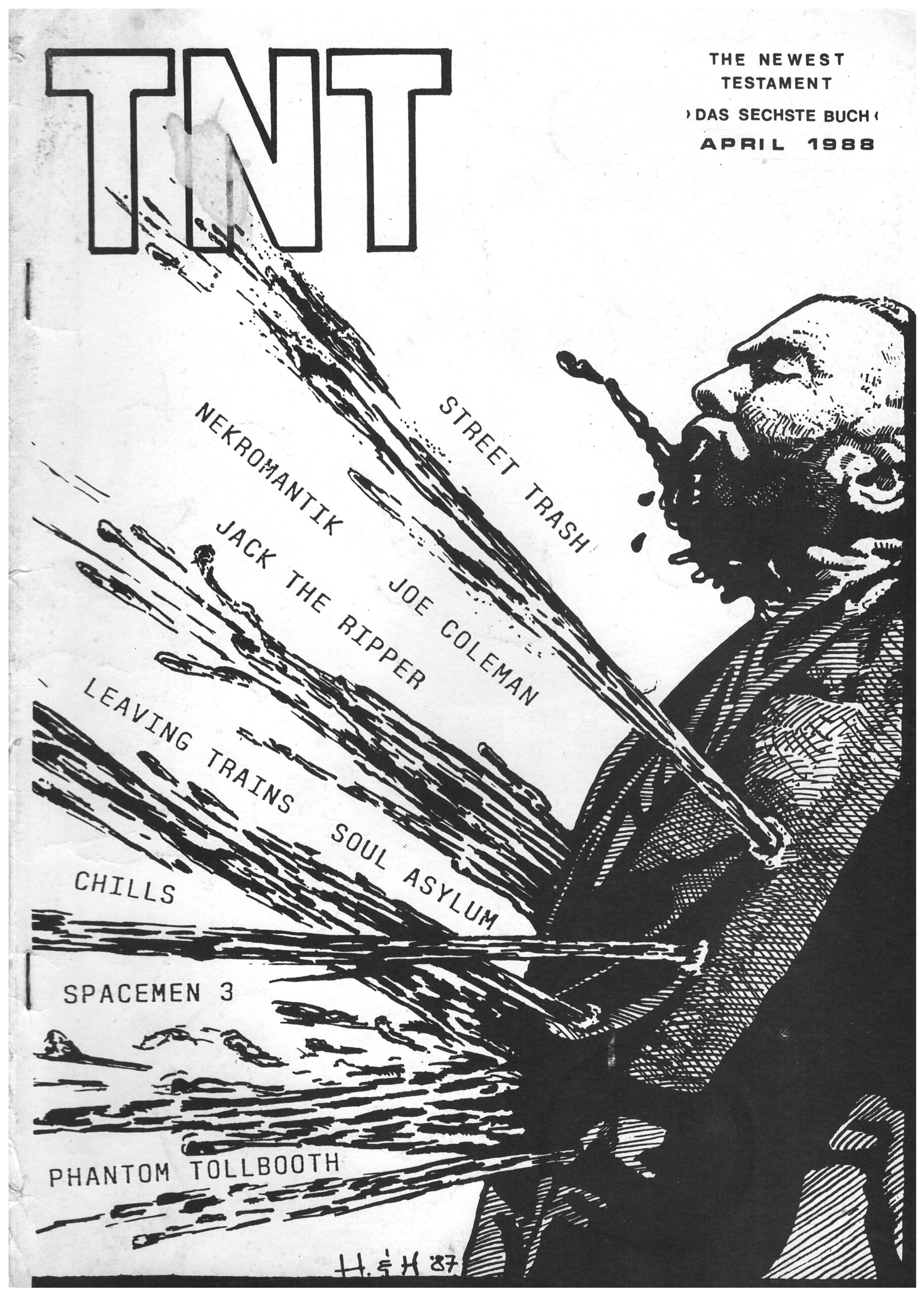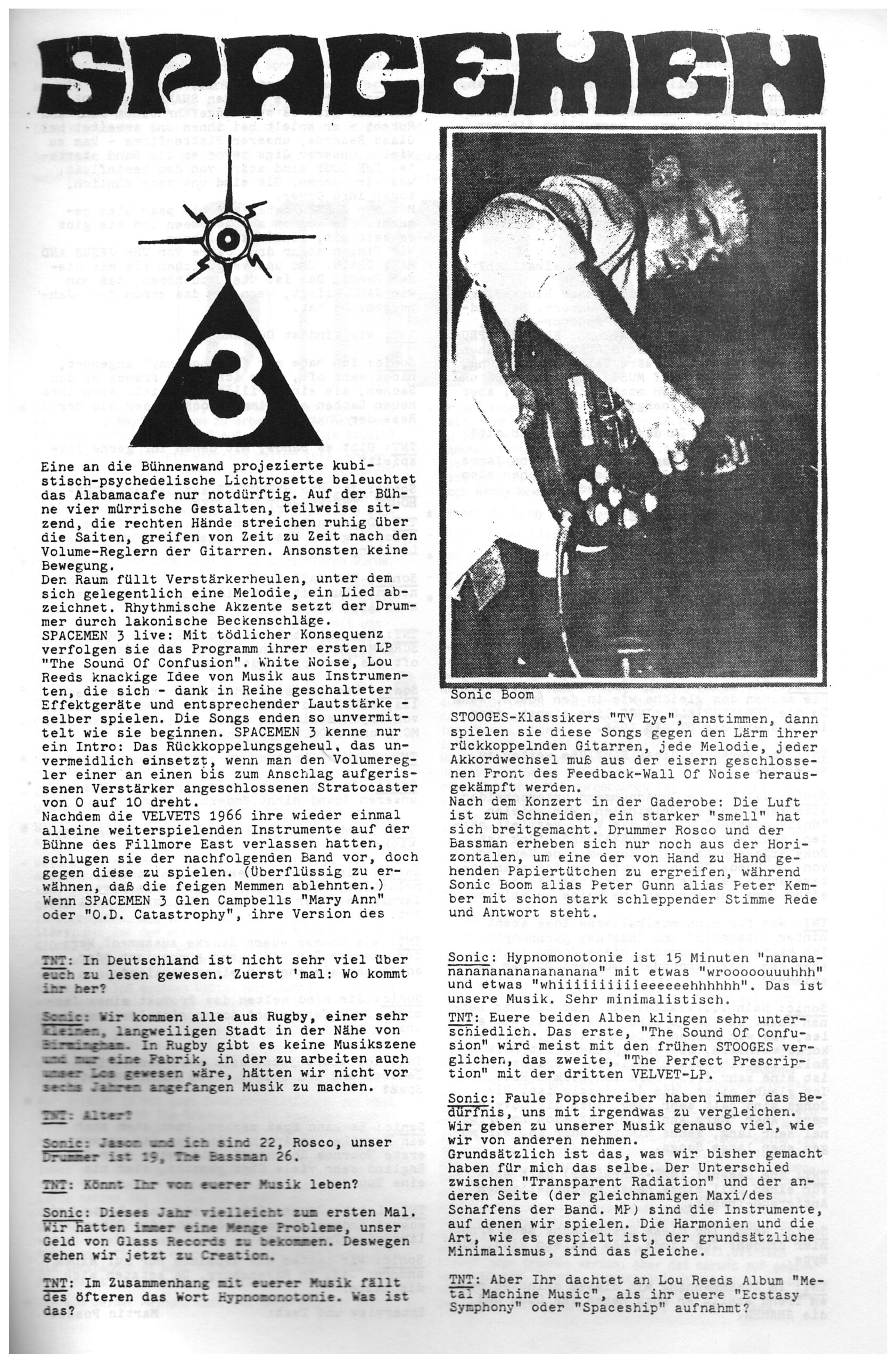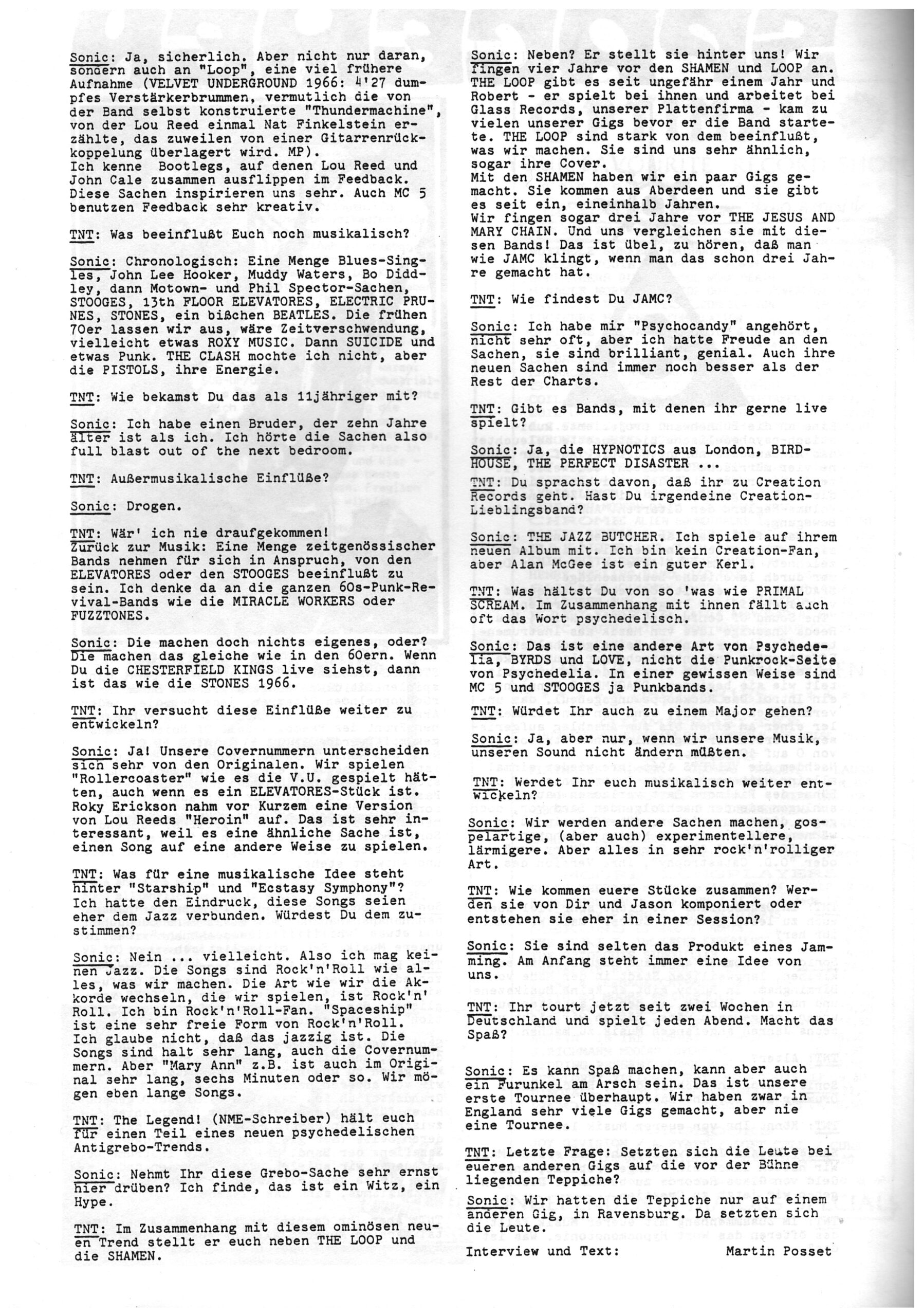Text
Eine an die Bühnenwand projezierte kubi-stisch-psychedelische Lichtrosette beleuchtet das Alabamacafe nur notdürftig. Auf der Bühne vier mürrische Gestalten, teilweise sitzend, die rechen Hände streichen ruhig über die Saiten, greifen von Zeit zu Zeit nach den Volume-Reglern der Gitarren. Ansonsten keine Bewegung.
Den Raum füllt Verstärkerheulen, unter dem sich gelegentlich eine Melodie, ein Lied abzeichnet. Rhythmische Akzente setzt der Drummer durch lakonische Beckenschläge.
SPACEMEN 3 live: Mit tödlicher Konequenz verfolgen sie das Programm ihrer ersten LP “The Sound Of Confusion”. White Noise, Lou Reeds knackige Idee von Musik aus Instrumenten, die sich – dank in Reihe geschalteter Effentgeräte und entsprechender Lautstärke – selber spielen. Die Songs ended so unvermittelt wie sie geginnen. SPACEMEN 3 kenne nu rein Intro: Das Rückkoppelungsgeheul, das unvermeidlich einsetzt, wenn man den Volumeregler einer an einen bis zum Anschlag aufgerissenen Verstärker angeschlossenen Stratocaster von 0 auf 10 dreht.
Nachdem die VELVETS 1966 ihre wieder einmal alleine weiterspielenden Instrumente auf der Bühne des Fillmore East verlassen hatten, schlugen sie der nachfolgenden Band vor, doch gegen diese zu spielen. (Überflüssig zu erwähnen, daß die feigen Memmen ablehnten.) Wenn SPACEMEN 3 Glen Campbells “Mary Ann” oder “O.D. Catastrophy”, ihre Version des STOOGES-Klassikers “TV Eye”, anstimmen, dann spielen sie diese Songs gegen den Lärm ihrer rückkoppelnden Gitarren, jede Melodie, jeder Akkordwechsel muß aus der eisern geschlossenen Front des Feedback-Wall Of Noise herausgekämpft warden.
Nach dem Konzert in der Gaderobe: Die Luft ist zum Schneiden, ein starker “smell” hat sich breitgemacht. Drummer Rosco und der Bassman erheben sich nur noch aus der Horizontalen, um eine der von Hand zu Hand gehenden Papiertütchen zu ergreifen, während Sonic Boom alias Peter Gunn alias Peter Kember mit schon stark schleppender Stimme Rede und Antwort steht.
TNT: In Deutschland ist nicht sehr viel über euch zu lessen gewesen. Zuerst ‘mal: Wo kommt ihr her?
Sonic: Wir kommen alle aus Rugby, einer sehr kleinen, langweiligen Stadt in der Nähe von Birmingham. In Rugby gibt es keine Musikszene und mur eine Fabrik, in der zu arbeiten auch unser Los gewesen wäre, hätten wir nicht vor sechs Jahrem angefangen Musik zu machen.
TNT: Alter?
Sonic: Jason und ich sind 22, Rosco, unser Drummer ist 19, The Bassman 26.
TNT: Könnt Ihr von euerer Musik leben?
Sonic: Dieses Jahr vielleicht zum ersten Mal. Wir hatten immer eine Menge Probleme, unser Geld von Glass Records zu bekommen. Deswegen gehen wir jetzt zu Creation.
TNT: Im Zusammenhang mit euerer Musik fällt des öfteren das Wort Hypnomonotonie. Was ist das?
Sonic: Hypnomonotonie ist 15 Minuten “nananananananananananana” mit etwas “wrooooouuuhhh” und etwas “whiiiiiiiiiieeeeeehhhhhh”. Das ist unsere Musik. Sehr minimalistisch.
TNT: Euere beiden Alben klingen sehr unterschiedlich. Das erste, “The Sound Of Confusion” wird meist mit den frühen STOOGES verglichen, das zweite, “The Perfect Prescription” mit der dritten VELVET-LP.
Sonic: Faule Popschreiber haben immer das Bedürfnis, un smit irgendwas zu verglichen. Wir geben zu unserer Musik genauso viel, wie wir von anderen nehmen.
Grundsärzlich ist das, was wir bisher gemacht haben für mich das selbe. Der Unterschied zwischen “Transparent Radiation” und der anderen Seite (der gleichnamigen Maxi/des Schaffens der Band. MP) sind die Instrumente, auf denen wir spielen. Die Harmonien und die Art, wie es gespielt ist, der grundsätzliche Minimalismus, sind das gleiche.
TNT: Aber Ihr dachtet an Lou Reeds Album “Metal Machine Music”, als ihr euere “Ecstasty Symphony” oder “Spaceship” aufnahmt?
Sonic: Ja, sicherlich. Aber nicht nur daran, sondern auch an “Loop”, eine viel frühere Aufnahme (VELVET UNDERGROUND 1966: 4’27 dumpfes Verstärkerbrummen, vermutlich die von der Band selbst konstruierte “Thundermachine”, von der Lou Reed einmal Nat Finkelstein erzählte, das zuweilen von einer Gitarrenrückkoppelung überlagert wird. MP). Ich kenne Bootlegs, auf denen Lou Reed und John Cale zusammen ausflippen im Feedback. Diese Sachen inspirieren uns sehr. Auch MC5 benutzen Feedback sehr kreativ.
TNT: Was beeinflußt Euch noch musikalisch?
Sonic: Chronologigisch: Eine Menge Blues-Singles, John Lee Hooker, Muddy Waters, Bo Diddley, dann Motown- und Phil Spector-Sachen, STOOGES, 13th FLOOR ELEVATORES, ELECTRIC PRUNES, STONES, ein bißchen BEATLES. Die frühen 70er lassen wir aus, wäre Zeitverschwendung, vielleicht etwas ROXY MUSIC. Dann SUICIDE und etwas Punk. THE CLASH mochte ich nicht, aber die PISTOLS, ihre Energie.
TNT: Wie bekamst Du das als 11jähriger mit?
Sonic: Ich habe einen Bruder, der zehn Jahre älter ist als ich. Ich hörte die Sachen also full blast out of the next bedroom.
TNT: Außermusikalische Einflüße?
Sonic: Drogen.
TNT: Wär’ ich nie draufgekommen! Zurück zur Musik: Eine Menge zeitgenössischer Bands nehmen für sich in Anspruch, von den ELEVATORES oder den STOOGES beeinflußt zu sein. Ich denke da an die ganzen 60s-Punk-Resvival-Bands wie die MIRACLE WORKERS oder FUZZTONES.
Sonic: Die machen doch nichts eigenes, oder? Die machen das gleiche wie in den 60ern. Wenn Du die CHESTERFIELD KINGS live siehst, dann ist das wie die STONES 1966.
TNT: Ihr versucht diese Einflüße weiter zu entwickeln?
Sonic: Ja! Unsere Covernummern unterscheiden sich sehr von den Originalen. Wir spielen “Rollercoaster” wie es die V.U. gespielt hätten, auch wenn es ein ELEVATORES-Stück ist. Roky Erickson nahm vor Kurzem eine Version von Lou Reeds “Heroin” auf. Das ist sehr interessant, weil es eine ähnliche Sache ist, einen Song auf eine andere Weise zu spielen.
TNT: Was für eine musikalische Idee steht hinter “Starship” und “Ecstasy Symphony”? Ich hatte den Eindruck, diese Songs seien eher dem Jazz verbunden. Würdest Du dem zustimmen?
Sonic: Nein… vielleicht. Also ich mag keinen Jazz. Sie Songs sind Rock’n’Roll wie alles, was wir machen. Die Art wie wir die Akkorde wechseln, die wir spielen, ist Rock’n’Roll. Ich bin Rock’n’Roll-Fan. “Spaceship” ist eine sehr freie Form von Rock’n’Roll. Ich glaube nicht, daß das jazzig ist. Die Songs sind halt sehr lang, auch die Covernummern. Aber “Mary Ann” z.B. ist auch im Original sehr lang, sechs Minuten oder so. Wir mögen eben lange Songs.
TNT: The Legend! (NME-Schreiber) halt euch für einen Teil eines neuen psychedelischen Antigrebo-Trends.
Sonic: Nehmt Ihr diese Grebo-Sache sehr Ernst hier drüben? Ich finde, das ist ein Witz, ein Hype.
TNT: Im Zusammenhang mit diesem ominösen neuen Trend stellt er euch neben THE LOOP und die SHAMEN.
Sonic: Neben? Er stellt sie hinter uns! Wir fingen vier Jahre vor den SHAMEN und LOOP en. THE LOOP gibt es seit ungefähr einem Jahr und Robert – es spielt bei ihnen und arbeitet bei Glass Records, unserer Plattenfirma – kam zu vielen unserer Gigs bevor er die Band startete THE LOOP sind stark von dem beeinflußt, was wir machen. Sie uns sehr ähnlich, sogar ihre Cover.
Mit den SHAMEN haben wire in parr Gigs gemacht. Sie kommen aus Aberdeen und sie gibt es seit ein, eineinhalb Jahren.
Wir fingen sogar drei Jahre vor THE JESUS AND MARY CHAIN. Und uns vergleichen sie mit diesen Bands! Das ist übel, zu hören, daß man wie JAMC klingt, wenn man das schon drei Jahre gemacht hat.
TNT: Wie findest du JAMC?
Sonic: Ich habe mir “Psychocandy” angehört, nicht sehr oft, aber ich hatte Freude an den Sachen, sie sind brilliant, genial. Auch ihre neuen Sachen sin dimmer noch besser als der Rest der Charts.
TNT: Gibt es Bands, mit denen ihr gerne live spielt?
Sonic: Ja, die HYPNOTICS aus London, BIRDHOUSE, THE PERFECT DISASTER…
TNT: Du sprachst davon, daß ihr zu Creation Records geht. Hast Du irgendeine Creation-Lieblingsband?
Sonic: THE JAZZ BUTCHER. Ich spiele auf ihrem neuen Album mit. Ich bin kein Creation-Fan, aber Alan McGee ist ein gutter Kerl.
TNT: Was hältst Du von so ‘was wie PRIMAL SCREAM. Im Zusammenhang mit ihnen fällt auch oft das Wort psychedelisch.
Sonic: Das ist eine andere Art von Psychedelia, BYRDS und LOVE, nicht die Punkrock-Seite von Psychedelia. In einer gewissen Weise sind MC5 und STOOGES ja Punkbands.
TNT: Würdet Ihr auch zu einem Major gehen?
Sonic: Ja, aber nur, wenn wir unsere Musik, unseren Sound nicht ändern müßten.
TNT: Werdet Ihr euch musikalisch weiter entwickeln?
Sonic: Wir warden andere Sachen machen, gospelartige, (aber auch) experimentellere, lärmigere. Aber alles in sehr rock’n’rolliger Art.
TNT: Wie kommen euere Stücke zusammen? Werden sie von Dir und Jason kompniert oder entstehen sie eher in einer Session?
Sonic: Sie sind selten immer eine Idee von uns.
TNT: Ihr tourt jetzt seit zwei Wochen in Deutschland und spielt jeden Abend. Macht das Spaß?
Sonic: Es kann Spaß machen, kann aber auch ein Furunkel am Arsch sein. Das ist unsere erste Tournee überhaupt. Wir haben zwar in England sehr viele Gigs gemacht, aber nie eine Tournee.
TNT: Letzte Frage: Setzten sich die Leute bei eueren anderen Gigs auf die vor der Bühne liegenden Teppiche?
Sonic: Wir hatten die Teppiche nur auf einem anderen Gig, in Ravensburg. Da setzten sich die Leute.
Interview und Text: Martin Posset
Translation
A cubistic-psychedelic rosette of light projected onto the stage wall illuminates the alabama safe only poorly. Four surly figures on stage, some of them sitting, their right hands calmly stroking the strings, reaching for the volume controls on the guitars from time to time. Otherwise no movement.
The room is filled with howling amplifiers, under which a melody or a song can occasionally emerge. The drummer sets rhythmic accents with laconic cymbals.
SPACEMEN 3 live: They follow the program of their first LP “The Sound Of Confusion” with deadly consistency. White Noise, Lou Reed’s crisp idea of music from instruments that – thanks to Effent devices connected in series and corresponding volume – play themselves. The songs ended as suddenly as they started. SPACEMEN 3 only knows intro: The feedback howling that inevitably sets in when you turn the volume control of a Stratocaster connected to an amplifier that is torn open from 0 to 10.
After the VELVETS left their instruments, which were once again playing alone on the stage of the Fillmore East, in 1966, they suggested that the following band play against them. (Needless to say, the cowardly cowards refused.) When SPACEMEN 3 was Glen Campbell’s “Mary Ann” or “O.D. Catastrophy ”, their version of the STOOGES classic“ TV Eye ”, then they play these songs against the noise of their feedback guitars, every melody, every chord change has to be fought out of the iron closed front of the feedback wall of noise.
After the concert in the dressing room: The air is ready to cut, a strong “smell” has spread. Drummer Rosco and the Bassman only rise from the horizontal to grab one of the paper bags that go from hand to hand, while Sonic Boom alias Peter Gunn alias Peter Kember is answering questions in an already sluggish voice.
TNT: There wasn’t very much to read about you in Germany. First ‘times: where are you from?
Sonic: We are all from rugby, a very small, boring town near Birmingham. There is no music scene in rugby and only a factory where we would have been fated to work had we not started making music six years ago.
TNT: age?
Sonic: Jason and I are 22, Rosco, our drummer is 19, The Bassman is 26.
TNT: Can you make a living from your music?
Sonic: Maybe for the first time this year. We always had a lot of trouble getting our money from Glass Records. That’s why we’re going to Creation now.
TNT: The word hypnomonotonia is often used in connection with your music. What’s this?
Sonic: Hypnomonotension is 15 minutes “nananananananananananana” with something “wrooooouuuhhh” and something “whiiiiiiiiiieeeeeehhhhhh”. This is our music. Very minimalistic.
TNT: Your two albums sound very different. The first, “The Sound Of Confusion” is usually compared to the early STOOGES, the second, “The Perfect Prescription” to the third VELVET LP.
Sonic: Lazy pop writers always feel the need to compare us to something. We give as much to our music as we take from others.
Basically, what we’ve done so far is the same for me. The difference between “Transparent Radiation” and the other side (the maxi of the same name / of the band’s work. MP) are the instruments we play on. The harmonies and the way it’s played, the basic minimalism, are the same.
TNT: But you thought of Lou Reed’s album “Metal Machine Music” when you recorded your “Ecstasty Symphony” or “Spaceship”?
Sonic: Yes, of course. But not only on that, but also on “Loop”, a much earlier recording (VELVET UNDERGROUND 1966: 4’27 dull amplifier hum, probably the “Thundermachine” constructed by the band itself, about which Nat Finkelstein once told Lou Reed, sometimes about a guitar feedback is superimposed. MP). I know bootlegs where Lou Reed and John Cale freak out about feedback together. These things inspire us a lot. MC5 also use feedback very creatively.
TNT: What else influences you musically?
Sonic: Chronologically: Lots of blues singles, John Lee Hooker, Muddy Waters, Bo Diddley, then Motown and Phil Spector stuff, STOOGES, 13th FLOOR ELEVATORES, ELECTRIC PRUNES, STONES, a bit of BEATLES. We skip the early 70s, it would be a waste of time, maybe some ROXY MUSIC. Then SUICIDE and some punk. I didn’t like THE CLASH, but the PISTOLS, their energy.
TNT: How did you find out when you were 11 years old?
Sonic: I have a brother who is ten years older than me. So I heard things full blast out of the next bedroom.
TNT: Outside musical influences?
Sonic: Drugs.
TNT: I would never have figured it out! Back to music: A lot of contemporary bands claim to be influenced by the ELEVATORES or the STOOGES. I am thinking of all the 60s punk rescue bands like the MIRACLE WORKERS or FUZZTONES.
Sonic: They don’t do anything of their own, do they? They do the same as in the 60s. When you see the CHESTERFIELD KINGS live, it’s like the STONES 1966.
TNT: Are you trying to develop these influences further?
Sonic: Yes! Our cover numbers are very different from the originals. We play “Rollercoaster” like the V.U. even if it’s an ELEVATORES piece. Roky Erickson recently recorded a version of Lou Reed’s “Heroin”. It’s very interesting because it’s a similar thing to play a song in a different way.
TNT: What is the musical idea behind “Starship” and “Ecstasy Symphony”? I got the impression that these songs were more related to jazz. Would you agree with that?
Sonic: No … maybe. So I don’t like jazz. They songs are rock’n’roll like everything we do. The way we change the chords we play is rock’n’roll. I’m a rock’n’roll fan. “Spaceship” is a very free form of rock’n’roll. I don’t think that’s jazzy. The songs are very long, including the cover numbers. But “Mary Ann” e.g. is also very long in the original, six minutes or so. We just like long songs.
TNT: The Legend! (NME writer) think you are part of a new psychedelic anti -rebo trend.
Sonic: Are you taking this Grebo thing very seriously over here? I think it’s a joke, a hype.
TNT: In connection with this ominous new trend, he puts you next to THE LOOP and the SHAMEN.
Sonic: Besides? He puts them behind us! We started four years before the SHAMEN and LOOP s. THE LOOP has been around for about a year and Robert – he plays for them and works for Glass Records, our record company – came to a lot of our gigs before he started THE LOOP are deeply influenced by what we do. They look very much like us, even their covers.
We did some gigs with the SHAMEN. You’re from Aberdeen and have been around for a year and a half.
We even started three years before THE JESUS AND MARY CHAIN. And they compare us to these bands! It’s bad to hear that you sound like JAMC when you’ve been doing it for three years.
TNT: How do you like JAMC?
Sonic: I listened to “Psychocandy”, not very often, but I enjoyed the things, they are brilliant, awesome. Her new stuff is even better than the rest of the charts.
TNT: Are there any bands that you like to play live with?
Sonic: Yes, the HYPNOTICS from London, BIRDHOUSE, THE PERFECT DISASTER …
TNT: You mentioned going to Creation Records. Do you have any favorite creation band?
Sonic: THE JAZZ BUTCHER. I’m playing on their new album. I’m not a fan of Creation, but Alan McGee is a good guy.
TNT: What do you think of something like PRIMAL SCREAM. The word psychedelic is often used in connection with them.
Sonic: It’s a different kind of psychedelia, BYRDS and LOVE, not the punk rock side of psychedelia. In a way, MC5 and STOOGES are punk bands.
TNT: Would you also go to a major?
Sonic: Yes, but only if we don’t have to change our music, our sound.
TNT: Will you continue to develop musically?
Sonic: We’ll do other things, gospel-like, (but also) more experimental, noisy. But everything in a very rock’n’roll way.
TNT: How do your pieces come together? Do you and Jason compose them or do they arise in a session?
Sonic: They’re rarely always an idea of ours.
TNT: You have been touring Germany for two weeks now and play every evening. Is it fun?
Sonic: It can be fun, but it can also be a boil on your ass. This is our first ever tour. We did a lot of gigs in England, but never a tour.
TNT: Last question: at your other gigs, did people sit on the carpets in front of the stage?
Sonic: We only had the carpets on another gig, in Ravensburg. People sat down there.
Interview and text: Martin Posset


